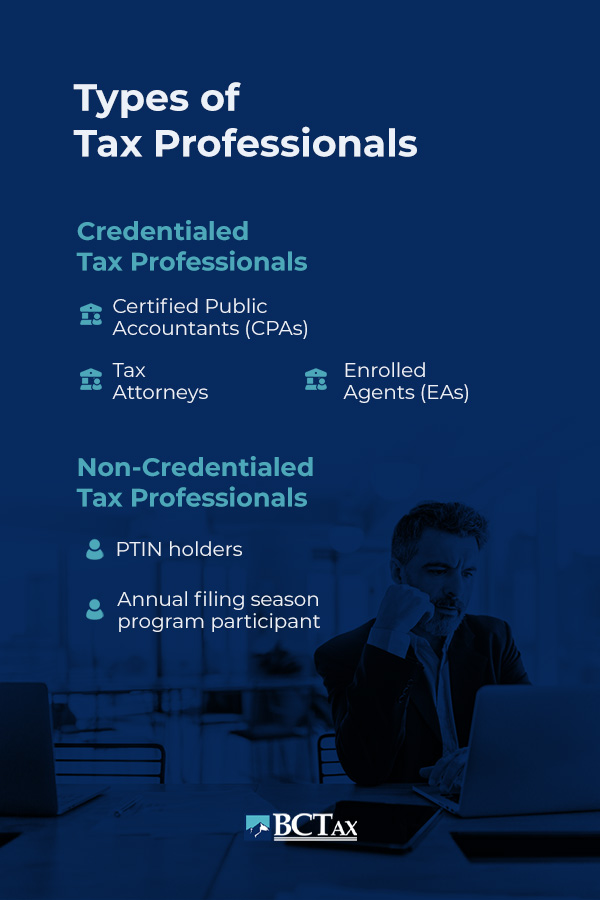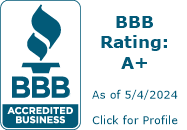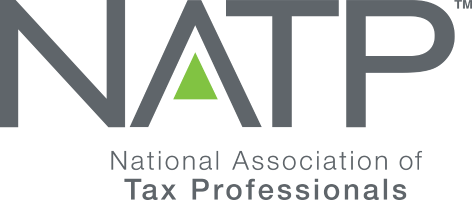
Handling tax problems can be frustrating. That’s why it’s vital to get professional assistance. Tax preparers have experience to help file your taxes and implement strategies to lower your tax liability. Additionally, they can help you negotiate and find practical solutions for your back taxes, which, if improperly handled, can accumulate penalties and interests.
However, before you choose a tax professional, check their qualifications and history to confirm their credibility and experience. It also helps to compare fees from multiple companies and determine whether they offer advantageous services like free consultation before signing the contract. This information can help you choose a suitable partner.
What Is a Tax Professional?
A tax professional is an individual or company with the credentials, practical experience and knowledge to assist taxpayers with tax preparation and other related services, typically for a fee. They learn the jurisdiction’s tax laws and have the qualifications and skills to solve many complex tax problems.
Tax professionals also stay up-to-date with the tax laws to offer their clients the best and most efficient services. Tax laws change rapidly, sometimes every year, making them complex for many people. These changes directly impact how much tax you are required to pay and what you get as a refund.
The Internal Revenue Service (IRS) may authorize tax service providers to represent taxpayers in tax-related matters. Those professionals are known as Federally Authorized Tax Practitioners (FATPs). Other trained and self-taught individuals also offer professional tax services without credentials from a third-party issuing organization. Some providers may be regulated by a governing authority.
The tax professionals you choose will collect your personal information to enable them to perform optimally. They may want to know about your income, marriage status, children and overall financial situation because those factors affect your tax liability or benefits. Thoroughly research and select a professional who respects your privacy while providing the best possible solution.
What Is a Professional Service for Taxes?

Professional tax services generally include the following:
- Tax planning: Planning involves setting up your finances to increase savings. The aim may be to lessen your tax liability by using exemptions, rebates, deductions, credits and other benefits. You can adopt several strategies, such as contributing to a tax-deductible retirement plan, deferring income tax liabilities, making charitable donations and maximizing health savings account (HSA) contributions.
- Tax preparation: Tax prep is readying and filing income tax returns as the law requires. Taxpayers must submit a tax return each year and pay the IRS any monies owed. Complying with the law helps you avoid penalties and other legal sanctions.
- Audit defense: The IRS can audit individuals and businesses to determine compliance with tax laws. The auditing process can be intimidating and stressful for most people, but you can hire a tax professional for assistance. The tax professional will examine your financial situation, handle correspondence, file the necessary paperwork and make compelling arguments to avoid adverse legal consequences.
- Tax transcript protest: The IRS sometimes makes mistakes when filing tax returns, like adding your business partner’s income to yours or counting your income twice. Tax professionals can review your financial documents to determine whether you have a valid claim. Then, they can contact the IRS directly to find a solution.
- Back tax services: Back taxes are federal and state taxes due for the previous years that have gone fully or partially unpaid. Back taxes accumulate penalties and interest, which can be substantial if not well-managed. Tax professionals can help you negotiate with the IRS and develop a payment plan to allow you to pay your taxes over an extended period.
- Trust fund recovery assistance: The IRS can impose a trust fund recovery penalty if you withhold income taxes, social security and Medicare payments from an employee’s paycheck without sending the money to the IRS. Business owners hire tax professionals to help them develop strategies for calculating, withholding and paying such funds on time. Payroll tax levies can significantly impact your finances.
- Tax resolution: Resolution involves working with the IRS and tax professionals to find practical solutions to your tax problems. The tax professional will examine your situation to determine the cause of your issue and develop strategies to remove, reduce or reverse it.
What Are the Different Types of Tax Professionals?
Broadly, tax professionals are credentialed or non-credentialed.
Credentialed Tax Professionals
These professionals receive credentials from the IRS or a state board. They include the following:
1. Certified Public Accountants (CPAs)

CPAs are accounting professionals licensed and accredited by a state or territory to offer accounting services, including tax preparation and planning, to the public. They must gain specified educational qualifications and skills and follow established ethical protocols. The Department of Treasury grants CPAs the right to represent taxpayers before the IRS.
CPAs specializing in taxes can identify credits and deductions to help you reduce taxes or increase refunds. For example, they can review your dependant expenses, charitable contributions and mortgage tax deductions to maximize your tax savings. They can also advise businesses on their investment incomes and industry-specific deductions that companies may ordinarily miss.
2. Enrolled Agents (EAs)
Enrolled agents are highly skilled professionals licensed by the IRS to represent taxpayers in complex issues. A person may qualify as an EA in one of two ways. First, they can write and pass the IRS’s three-part special enrollment examination. Second, they may qualify with the relevant work experience if they are former IRS employees. Enrolled agents must also stay up-to-date with tax laws by engaging in continuing education for a specified period.
3. Tax Attorneys
Some attorneys specialize in tax law. They have law degrees and licenses to practice law in the state. Lawyers are governed by strict ethical rules to protect their clients.
Tax attorneys have an in-depth knowledge of tax laws. They advise clients on several tax-related legal matters and sometimes prepare tax returns for individuals and businesses. They can also represent clients before the IRS concerning payment and collection issues or appeals.
Non-Credentialed Tax Professionals
These individuals don’t have licenses or credentials from third-party organizations but have the experience and knowledge to help people with their tax problems. Some gain their knowledge through tax institutions, while others are self-taught. The IRS may also authorize certain persons to provide limited services. Here are the two most common:
- Preparer tax identification number (PTIN) holders: These are tax preparers with no professional credentials. They can prepare tax returns but cannot represent you before the IRS unless they prepared and signed the document before the end of 2015.
- Annual filing season program participants: These tax preparers also have an active PTIN but must undertake 18 hours of continuing education each year from IRS-approved providers. They can represent you before the IRS, although they have limited rights.
Why Hire a Tax Professional?
Hiring a tax professional has many benefits, including the following:
1. Develop Effective Tax Strategies
Tax professionals understand tax laws and know how to lower tax liability. They may be able to reduce your taxable income and tax owed legally. This differs from tax evasion, an illegal method of concealing income and information from the IRS or other tax authorities to avoid tax payments. Tax professionals can dig into the tax code and uncover deductions or plan your finances such that you pay fewer taxes.
There are different strategies depending on the circumstances of your situation. Here are some examples:
- Tax credits: If you are eligible for any tax credit, you can reduce the income tax you owe to the federal and state governments. Credits are typically designed to reward or encourage certain types of behavior considered beneficial to the environment or economy. Federal tax credits include the earned income credit (EIC), the child and dependent care credit, education tax credits, and credits for eligible individual retirement arrangement (IRA) contributions.
- Charitable contributions: Making donations to charity can result in tax savings. In addition to donations, you can deduct related expenses like travel and accommodation costs to lower your tax bill. However, it’s essential to ensure that the organization is a non-profit.
- Retirement savings: Contributing to a traditional individual retirement account (IRA) can reduce your tax liability by reducing your taxable income. However, you pay income taxes when you take distributions. Contributions to Roth IRAs use post-tax funds, so distributions are tax-free.
- HSA contributions: Pre-tax HRA contributions can also reduce your taxable income. You can make contributions until the tax deadline and apply the deductions to the current tax year. This means you can keep reducing your taxes even after December 31.
- Investment loss harvest: If you make a loss on a capital investment, you can report it to lessen your tax liability. When filing your returns, use the loss to offset capital gains taxes.
- Business expense maximization: Business owners can deduct expenses incurred to reduce their taxable income. These expenses include rent, inventory, repairs and utilities.
2. Avoid Costly Mistakes
People often make mistakes while filing taxes, but some errors can be costly. Errors can lead to audits or penalties, although others may be caught, corrected and forgiven. If you are claiming a refund, the error can result in delays.
Tax professionals prepare and file tax returns for a living. They are familiar with the processes, which reduces the likelihood of errors. Additionally, errors can expose them to risks such as reputational damage and lawsuits, so they take great care. Tax professionals can help you file accurate tax returns and quickly identify errors.
3. Saves Time and Money
Leveraging the services of tax professionals is an excellent strategy for saving time and money. Established tax companies have the resources to do your taxes within short periods and more accurately. They can prepare and file tax returns with fewer errors, which is helpful if you apply for a refund. Also, when you encounter problems with your taxes, tax professionals can handle all correspondence and provide you with updates, which could otherwise be intense and time-consuming.
Working with tax professionals buys you more time to focus on other parts of your business or spend with your family and friends. Additionally, reducing errors decreases the chance of penalties, which can accumulate into thousands of dollars.
4. Find a Solution for Your Back Taxes

If you have back taxes, implementing strategies that can help you avoid or reduce the penalties is essential. Regardless of the reason or how much you owe, it’s best to hire a reputable tax company to guide you throughout the process.
Tax professionals can help you negotiate with the IRS or state tax agency to develop a practical payment plan, like installment payments over an extended period. They can also help you file an offer in compromise, which can allow you to settle your tax debts for less than the amount you owe.
Depending on the circumstances of your case, the tax professional can also assist you in applying for non-collectible tax status. This application allows the IRS to examine your financial situation and declare your tax debts non-collectible if they conclude that you cannot pay your back taxes. If successful, the IRS will stop aggressive collection efforts, like imposing tax liens and levies and garnishing wages. However, the debt will still accumulate interest and penalties.
5. Get Peace of Mind
Dealing with tax issues can be frustrating, but you don’t have to do it alone. You can hire a tax professional to handle complex processes and stressful situations like filing and audits. Income tax preparers know the ins and outs of taxes and usually have strong teams to lean on for your tax needs. Knowing that your problems are in the hands of a professional can be reassuring.
Tips for Choosing the Right Tax Professional
While income tax preparers offer many benefits, choosing who to partner with is vital. Here are four things to help you know they are right for you:
- Check qualifications: Before choosing a tax preparer, check if they have the necessary qualifications to perform in that capacity. Also, inquire if they have accreditations from institutions like the National Association of Enrolled Agents (NAEA), the National Association of Tax Professionals (NATP), the Association of International Certified Professional Accounts (AICPA) and the IRS. These qualifications help confirm their credibility and the level of experience they have in that role.
- Check history: Knowing the person’s history is essential for many reasons. For example, it helps you determine whether the person has dealt with similar problems and how they treat their customers.
- Compare fees: Research multiple companies and ask about their fee structure. Some charge on a percentage basis, while others use flat rates. Also, choosing a professional with an excellent track record is crucial since the most affordable may not be right for you.
- Free consultation: Professionals offering free consultation are often preferable because you can determine if they fit your criteria. A consult also enables you to learn all your options before deciding whether they are the ideal candidate.
Contact BC Tax for Professional Income Tax Services
BC Tax is a tax consultation agency with years of experience helping customers with income tax preparation, resolution and back taxes. We offer free and quality tax consultation without any commitment. We aim to help you assess all available options before beginning your journey with us. If you have any challenges with your income taxes, contact us now!

 1-800-548-4639
1-800-548-4639









